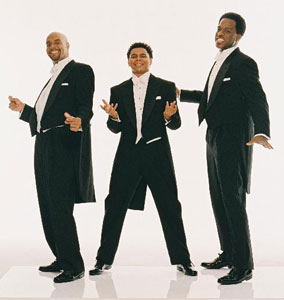SITE GUIDE
SEARCH
REVIEWS
REVIEW ARCHIVES
ADVERTISING AT CURTAINUP
FEATURES
NEWS
Etcetera and
Short Term Listings
LISTINGS
Broadway
Off-Broadway
NYC Restaurants
BOOKS and CDs
OTHER PLACES
Berkshires
London
California
New Jersey
DC
Philadelphia
Elsewhere
QUOTES
TKTS
PLAYWRIGHTS' ALBUMS
LETTERS TO EDITOR
FILM
LINKS
MISCELLANEOUS
Free Updates
Masthead
Writing for Us
A CurtainUp Review
Three Mo' Tenors

Duane A. Moody, Victor Robertson, and
James N. Berger
|
"Music hath charms to soothe a savage breast, to soften rocks, or bend a knotted oak," wrote William Congreve. It sure does when the music comes from three gifted and personable African-American tenors who are enhancing the New York theater scene with some spiffy and spectacular selections from the classical, musical theater, jazz, blues, pop, soul, rap, rock and gospel repertoire.
Do they leave out any sampling of our musical heritage except maybe a Gregorian chant? Not much. Their concerted take on a formidable range of compositions is a progressive leap beyond what was offered in the extraordinarily popular concerts given by those two world class Spaniards and one Italian.
Although there are actually six singers in total who alternate due to the wear and tear on the voice, it was Cast A — Duane A. Moody, James N. Berger, Jr. and Victor Robertson — that brought their coordinated and individual charms to the songs at the performance I attended. Each has a distinct timber and quality designed to compliment the other as they rummage through 400 years of great music.
It shouldn't come as a surprise that the fast-moving show has been conceived, directed and choreographed by Marion J. Caffey with an eye for movement, amusement and (on occasion) a flashy adornment. Every song gets the full throttle of emotional and physical involvement, especially in the second half of the show when Caffey's choreography includes many of the signature moves made famous by the popular rock and soul groups, moves these three singers have down to perfection.
Although the singers are handsomely garbed in semi-formal attire, there are some witty changes; for example, the zoot suit and purple hat with feather that Moody dons for the Cab Calloway "Minnie the Moocher" tribute, and the vivid open neckline shirt worn by Robertson for the Al Jarreau-styled "Spain."
The super musical arrangements of Joseph Joubert, as played by five terrific musicians — Fabiola Leon (keyboards 1), Etienn Litel (keyboards 11), Carl Carter (bass), Steve Williams (drums). The only musician seen throughout the show is conductor/pianist Keith Burton at stage left.
Understandably opening with the more sedate classical repertoire and building toward a spirited Gospel-ized finish and a reprise of the prayerful and politically potent "Make Them Hear You" from Ragtime, the core of the program reflects a contemporary attitude. The bit of tongue-in-cheekiness during the "Donna e Mobile," from Verdi's Rigoletto served to relax the audience as well as to introduce these wonderful voices.
The classical portion was also highlighted by Moody's rendition of Verdi's "De Miei Bollenti Spiriti" from La Traviata, Bergera's stirring "I Hear an Army" by Samuel Barber and Robertson's octave-spanning brilliance in "Hh Mes Amis" from Donizetti's La Filled u Regiment.
Having the lightest and brightest tenor voice, Robertson also demonstrated his affinity for Paris blues and scat. During the thoughtfully picked of show tunes, Berger registered strongly with "Being Alive" from Company and together with Robertson in the poignant (and topical) "Bring Him Home," from Les Miserables.The Little Shubert really began to rock during the second half salute to Ray Charles.
The concert-revue's simply design by Michael Carnahan is notable for the curved proscenium that suggests a miniature Radio City Music Hall. It's often bathed in a blue light by designer Richard Winkler.
A few complaints: The at times deafening sound level and the use of head mikes which do a disservice to the singers' training and often diminish subtlety, nuance, clarity and detail. These are men with strong, resonant operatic voices. An argument could be made for the integration of amplification in rock music, but here an opportunity is lost to show an audience how thrilling the human voice really can be. This quibble aside, you will be hard pressed to hear better singers anywhere along the Great White Way.
|
Three Mo' Tenors Produced by Willette Murphy Klausner& Conceived, directed and choreographed by Marion J. Caffey Set Designer: Michael Carnahan Lighting Designer: Richard Winkler Costume Designer: Gail Cooper-Hecht Sound Designer: Domonic Sack Music Supervisor Arranger/Orchestrator: Joseph Joubert Music Director: Keith Burton Running time: 2 hours including intermission The Little Shubert Theater, 422 W. 42nd Street(212) 239 6200 vTuesday - Friday @ 8pm, Saturday @ 2pm and 8pm, Sunday @ 2pm and 6:30pm, after 10/08 Tuesday to Saturday @ 8pm, Wednesday and Saturday @ 2pm, Sunday @ 3pm From 9/12/07 to 1/27/08; opening 9/27/07 Tickets: $76.45 Reviewed by Simon Saltzman based on performance 09/25/07 |
Try onlineseats.com for great seats to
Wicked
Jersey Boys
The Little Mermaid
Lion King
Shrek The Musical

The Playbill Broadway YearBook

Leonard Maltin's 2007 Movie Guide


Wicked
Jersey Boys
The Little Mermaid
Lion King
Shrek The Musical

The Playbill Broadway YearBook

Leonard Maltin's 2007 Movie Guide


